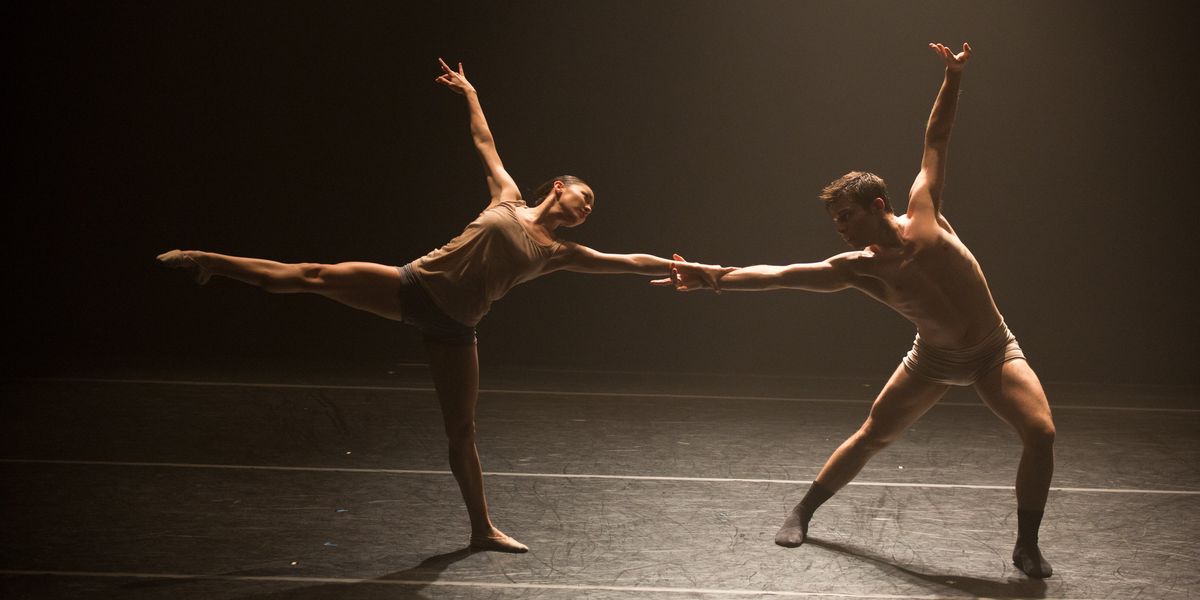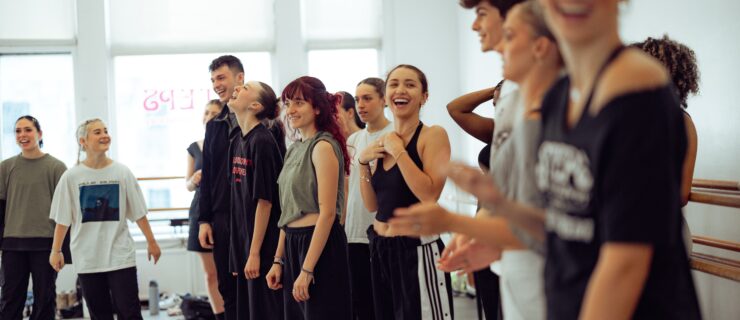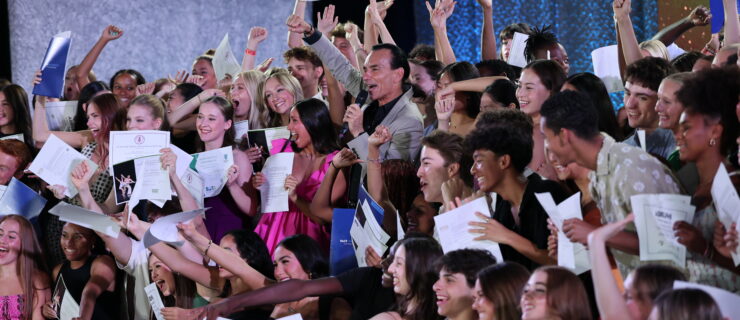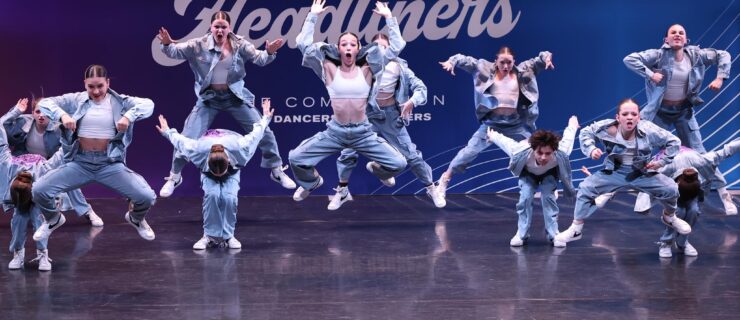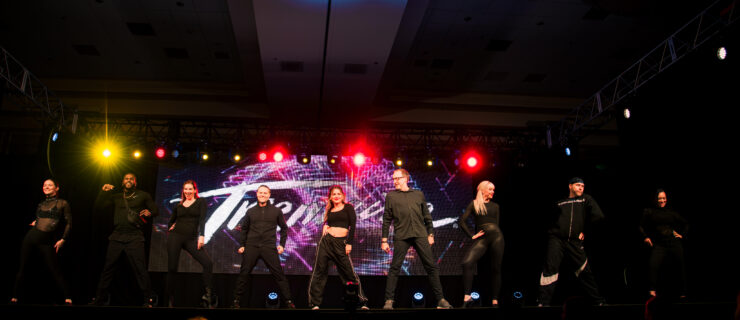4 College Alums on How Their Dance Degrees Have Helped Them During COVID-19
In a year that couldn’t possibly get any more bonkers (we wouldn’t be surprised, though), the world needs smart, resourceful, and creative people more than ever before. And who does that description remind us of? That’s right…dancers. It may seem like jobs for dancers are scarce these days, but in reality, there are plenty of opportunities out there for dancers willing to think outside of the box. A college degree in dance can help you do just that—expand your career possibilities and develop your potential—even in the midst of a global pandemic.
Dance Spirit
spoke to four alumni of Marymount Manhattan College, a liberal arts school in NYC with one of the most prestigious dance programs in the country, to explore all the ways their MMC dance degrees have helped them navigate the dance world, both before and during the pandemic.
Austin Sora

Austin Sora (Photo by Nicole Rose, courtesy Sora)
Originally from Toronto, Canada, but now based in NYC, Austin Sora is the dancer-textbook definition of “versatile,” largely thanks to her time spent at Marymount Manhattan. As a BFA dance major with an arts management minor, Sora spent her college years exploring the dance world both onstage and off. “I’ve always been academically inclined, and I knew that I wanted to keep learning before I was ready to start auditioning,” she explains.
At Marymount, the city itself became Sora’s classroom.”We would see shows and take trips to museums, and then talk about them in class the next day,” she says. “Part of my college experience was hopping on the subway to my internship between classes, or performing at a theater in Brooklyn.” Sora’s unique college experiences helped her secure not one but two jobs post-grad: apprenticing with Buglisi Dance Theatre, and working at Artists Striving to End Poverty (ASTEP), an NYC-based nonprofit where she had interned as part of her minor. “I completed my minor to prepare me for life after my dance career was over, never thinking I’d be able to have two simultaneous careers,” she says. “Especially now, it’s come in handy.”
Fast-forward to this past March, when Sora had just completed a national tour of Phantom of the Opera. Although the onset of the pandemic put plans for her next dance job on pause, she’s still been able to thrive artistically, thanks to her work with ASTEP, and has even used this time to develop her own passion project: “My own venture is an online resource for dancers called Studio A. I figured it was a good opportunity to share any knowledge that I’ve gathered with dancers who are just starting out or currently working,” she says.
Overall, Sora credits her BFA in dance and minor in arts management for giving her the tools and resources necessary to flourish. “My career has taken so many turns, but I’ve never been unprepared thanks to Marymount.”
Gabrielle Sprauve

Gabrielle Sprauve (Photo by Rachel Neville, courtesy Sprauve)
Ballet Hispánico dancer Gabrielle Sprauve decided to go the college route in the hopes of forging connections that could help launch her career. “I liked the idea of being in smaller classes and having more individual attention from those teachers, which led to me choosing Marymount,” she says.
Ultimately, the relationships she built with her Marymount professors became one of the most impactful parts of her college experience. “My professors taught me, more than dance, how to handle life and how to go through the dance world and advocate for yourself,” she says. Before Marymount, Sprauve had always considered herself a ballerina. But throughout her time as a BFA dance major she discovered her love for modern, contemporary, and even commercial dance. After receiving her BFA with concentrations in both ballet and modern, Sprauve joined Ballet Hispánico and has been with the company ever since. And when her fourth season was abruptly paused in March due to COVID-19, Sprauve barely missed a beat. Between remote Zoom rehearsals with Chicago-based choreographer Stephanie Martinez, teaching for New Jersey Performing Arts Center, and signing with a modeling agency, she’s kept plenty busy through her strong career network .
“As dancers, we’re so adaptable, which I think is one of our best qualities,” she says. “Depending on whatever situation we’re in, we figure it out, and we know how to survive.”
Deanna Flanagan

Deanna Flanagan (Courtesy Flanagan)
“When deciding on college and my major, I wanted to have a well-rounded education so I could find new ways of using my artistry and dance education, in addition to performing,” says professional dancer and dance teacher Deanna Flanagan. From the moment she auditioned, she knew Marymount was the place to explore these possibilities. “I was never just a number. They wanted to hear all about me and what I wanted from the program,” she remembers.
Flanagan was surprised by all the different aspects of dance she discovered in college. “I thought majoring in dance would be very similar to dancing at my local studio,” she says. “But dance education at the college level is much more comprehensive, from intensive technique, music theory, composition, dance history, and diving into different aspects of the dance world I didn’t know about. MMC’s program opened my eyes to more career options than I thought possible,” she explains.
Flanagan started getting hands-on experience immediately once she started college as a BA dance major concentrating in teaching, with an arts management minor. “In my teaching classes, you had to apply the skills you learned right away,” she says. That meant internships, like teaching at the Ailey School and working at local arts companies in NJ. Towards the end of her senior year, Flanagan’s professor recommended her for a job teaching dance at a local high school, leading to her first full-time job postgraduation.
By the time the pandemic hit in March, Flanagan had completed her masters in dance education, joined the Jets Flight Crew, and was teaching dance full-time at an elementary school. The changes brought about by COVID-19 required Flanagan to put everything she’d learned to the test. “MMC taught me that there’s always opportunity on the horizon, and if there’s not, you can create it. That’s been so important to remember during this pandemic,” she says. “For me, that means creating my own way of training and making sure I can continue taking classes, and figuring out how to adapt my curricula to this new age of learning.” Thanks to her college experiences, Flanagan has managed to thrive doing just that. “Even though I’m young and just starting out in the grand scheme of things, I already have so many tools in my back pocket that I can use,” she says.
Andrew Mikhaiel

Andrew Mikhaiel performing with BJM in SOUL choreographed by Andonis Fonidadakis (Photo by Sasha Onyshchenko)
Andrew Mikhaiel grew up dancing both at competitions and at his performing arts high school in Canada. Encouraged to pursue college dance by his teachers, he enrolled at Marymount as a BFA dance major with a ballet concentration. “I do my best work when I’m able to have a dialogue between my teachers and other students, and that translates into my dance training as well,” he says. “I wanted that one-on-one attention from my professors, as opposed to being one of 500 people in a lecture hall.”
Mikhaiel utilized his time at Marymount to perform in several pieces each semester, take as many technique classes as possible, and most importantly, network. “I found a lot of opportunities both at Marymount and outside of college aided by the Marymount faculty, and also just from the personal connections I was able to make living in NYC,” Mikhaiel says. As part of Marymount’s liberal arts curriculum, Mikhaiel was also able to take courses like American Sign Language and Arts for Social Change. “Those classes broadened my perspective, gave my dancing more purpose, and helped me acknowledge how our bodies are capable of expressing important ideas, if we choose,” he says. Ultimately, Mikhaiel graduated with exactly what he came to college for: a job. “In January of my senior year, I auditioned for Les Ballets Jazz de Montréal (BJM), my favorite company. Six weeks later, I had signed a contract, which was a dream come true.”
In March, Mikhaiel had just embarked on a European tour with BJM when the company was sent back to Canada under stay-at-home orders. While he waited to return to the studio, he relied on the habits he had built in college. “Marymount does a good job of ingraining a sense of discipline and accountability. When we were at home for three months, it was second-nature for me to go on Zoom and take class consistently to keep up my training,” he says. And his work paid off: After quarantining, the entire company has just resumed rehearsals in an “artistic bubble” in Quebec.
